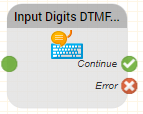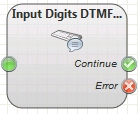as of release 3.27 | prior to release 3.27 |
|---|---|
Function
Saves the result of a DTMF input (tone dialling) or ASR input (Automatic Speech Recognition) with several digits in a variable.
First of all an (optional) prompt is played and an (optional) beep is played if this option is activated. After that, the system waits for the input of digits.
Speech input is performed by speaking the digits individually. Example: one two nine seven two. Not allowed is for example twelve thousand nine hundred and seventy two.
A combination of speech and DTMF is not allowed. It is not for example possible to complete a sequence of DTMFs by speaking the remaining digits or vice-versa.
When input is completed, the minimum and maximum lengths are checked. Execution of the routing application continues at the exit Continue if the input conforms to the constraining parameters. If not, execution continues at the error output.
Parameters
Object Name | The name of this object instance |
Prompt Type | Choose a prompt type |
Voice Prompt | Choose a prompt |
Play Tone | If you use this option, the system will play a beep indicating when |
Barge In | If activated, input is allowed whilst voice prompts are being played. |
Minimum Number of Digits | The minimum number of digits which is required to be entered (without #). |
Maximum Number of Digits | The maximum number of digits which is required to be entered (without #). |
# stops input | If this option is activated, pressing the # key stops input and the system |
Timeout no Digit | This option specifies how long the system waits at the beginning of input |
Timeout between Digits | This option specifies how long the system waits after a key has been |
Note: When asking callers to input long digit sequences it is recommended to use the option # stops input and to increase both timeout values.
Outputs
Output | Used when ... |
Continue | when the length of the input is valid according to the constraining parameters. |
Error | when the input is too short or too long. |

